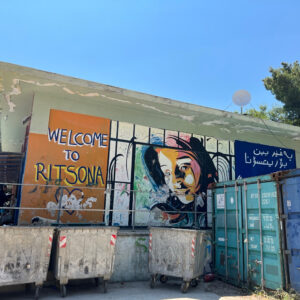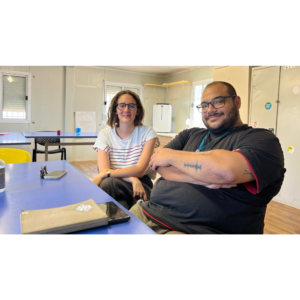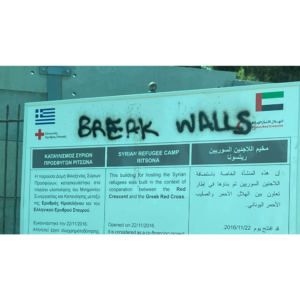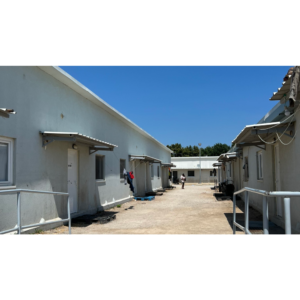“We hope that misery, war and persecution ends but understand this is not achievable”

Sofiya Suleimenova and OXSFJ tutor Tatev Hovhannisyan visit Ritsona Camp in Athens, Greece
August 25, 2023
Inside Greek refugee camp Ritsona’s mission to ‘safeguard human rights’
Ritsona refugee camp, located 75 km from Athens and 12 km from the closest urban centre Chalkida, hosts to this day around 1,200 refugees.
The camp, which has a capacity of around 3,000 residents, was first set up by the Red Crescent and the Greek Red Cross in 2016 in response to the influx of Syrians fleeing war. It is now operating as the biggest camp on the Greek mainland, holding an important part in providing a settlement for displaced people who have fled their countries.
The Ristona camp administration, in accordance with the Greek government, Ministry of Migration and Asylum, and with the collaboration of various non-governmental organisations (NGOs), is at the heart of asylum seekers being provided with necessities and support.
A Ritsona camp administration spokesperson explained: “Although everyone working in the areas of migration and asylum hopes that the misery, war, and persecution ends in all parts of the world, we understand that something like that is not achievable.”
“What we put our efforts in is to provide quality services to those in need, like safeguarding human rights.”
Speaking on behalf of the camp administration, Giorgos Lelos, site manager of the facility, expressed that the regional camp has “ongoing upgrades of the facilities” since it first started its operation in 2016 until today. He added: “Since 2020, it has become safer with better accommodation and service provisions.”
Yet, asylum seekers are still experiencing obstacles after fleeing their home countries, including receiving refugee status in Greece.
Upon my visit to the camp on July 18, the first thing that I noticed were razor wire fences, a gate, and the graffitied “Break Walls” writing over a camp sign.
While being shown around the camp, which now is home to largely Sub-Saharan refugees, most of the residents were inside their caravan-style Isoboxes or chatting under the shade of tents and trees, hiding from the unbearable summer heat.
A daily truck with water and food supplies arrived and the residents were taking packages out. The on-campus kindergarten was empty for summer vacation, and children were seen running around the camp.
Among the residents, a group of asylum seekers gathered to share their stories about how they reached Greece, how the camp is supporting them, and the struggles they face which included frustrations with the asylum procedure.
The biggest challenges migrants face upon their arrival to Greece is the asylum procedure, with many asylum seekers journeying to the European country as a transition point in the hopes of receiving refugee status and moving to North Europe. But this hope is not as easy as they might have envisioned.
The story of one middle-aged Iraqi couple sheds light on this. “We arrived on the 13th January, 2018”, the husband shared. “On the same day, I asked [applied for asylum] but they gave me two rejections, one after exactly 12 months and the second after two years”.
The couple did not give up, and applied again. They did their interview and are now waiting for the third response. When asked about the reason behind the rejections, the husband replied: “I don’t know. They don’t mention, they only say you are rejected.”
While asylum applications are being rejected due to the asylum seeker’s country, such as Iraq, being considered as ‘safe’, those seeking the refugee status highlighted that if “we were safe then we would have been back.”
Despite life in Greece being a safer place for those who have left their home countries, some have been left frustrated by what they consider to be a “lack of support” and limited opportunity to provide for themselves. An Afghan asylum seeker shared how he and others had “survived” their journey to Europe, but the hardships did not seem to end.
“The country that I receive support from, I will go there”, said one Iraqi asylum seeker. “It doesn’t matter if it’s Greece or some other European countries, but all of this comes down to support.”
The inability of the working class generation to do much during their asylum applications proves the limited opportunities that they are provided with.
The group of asylum seekers and refugees that I spoke with, with the help of translators, pointed out that “there used to be some organisations here which provided [them] with some activities, but now that they are gone, especially the older generation doesn’t have access either to jobs or any other activities… they mainly work with younger people now.”
Mr Lelos shed light on asylum seekers’ procedure upon arrival, which provides insight on the administration’s work.
First, they are informed of the rules of the camp and the services that are provided, such as the specific offices they can address for the whole duration of their stay. They are then given a form to sign, regarding their accommodations and the permission to process their personal data.
Once that is done, they receive a sort of kit that includes supplies and bed linens. Next, they are placed in their living accommodation according to their status – family, single, male, female, etc. If they are in need of special reception conditions, they are provided with those. They are straight away registered for catering services and referred to the camp’s medical and vulnerability team to review their medical history.
Asylum seekers, until their application gets approved, cannot work officially in Greece, making it very hard for residents of camps to receive monetary income.
For this reason, and in the words of a man who has encountered this problem: “on your own, you can search around and see if there is any demand for work – simple work – look after vegetables or some fruits. In order to get money, but it’s unofficial without contracts, stuff like that.”
Asylum seekers usually find jobs in the agricultural sector, which provides them with some sort of money. It is estimated that up to 90% of Greece’s agricultural wage labourers are migrants. Farm work is usually the only option that they can refer to while having no official documents.
The Iraqi husband said: “We’ve heard many times about human decency, but we haven’t seen it, we haven’t touched it. And this is not just a message from me.” To this statement, all the 12 present residents, who had gathered to share their experiences in a crowded room, nodded and agreed.
But despite these views, asylum seekers recognised the work of the camp administration in offering different facilities from education to care, and the limitations that it works under.
The Syrian American Medical Society (SAMS) in collaboration with the National Public Health organisation provides the residents with medical services. Those suffering from physical or psychological trauma are provided with external assistance from public hospitals and clinics to receive appropriate treatments.
Minors are straight away introduced to formal and non-formal education and given the ability to attend local schools. As part of the UNICEF program on children’s education, children from four to 17 years old are provided with English, Greek lessons, and various recreational activities.
With the permission of the Greek Ministry of Migration and Asylum, non-governmental organisations (NGOs) can offer legal support, there are also lawyers from a registry of asylum services who take on cases after the residents’ first rejection. The camp administration facilitates the procedure by hosting these meetings online sometimes.
Along with the rest of the professionals in the field, they “always try to close a cultural gap and teach solidarity and co-existence between all different ethnicities” during the asylum seekers’ stay at Ritsona, added Mr Lelos.
When asked about a success story of one of the residents, the administration told us the story of two Afghan teenage boys, who stayed in Ritsona with their mum from 2020 to 2023.
They started painting at 14 and 16 years old without any previous experience. Art interested them, so they attended art classes later on and participated in exhibitions in Thiva, a town nearby.
“They were painting in the camp during their free time along with their attendance at a Greek high school where they presented great skills and progress”, shared Fotoula Danai, reception assistant in the site management.
They also participated in an exhibition organised by the Michael Cacoyannis Foundation, during which critics praised the two brothers for their ability to express themselves artistically.
During my discussion with the refugees, they recognised that “in terms of support or help, they’re [the Greek government] doing whatever they can”, adding:” Because it’s not only one place or two places, it’s the centre of this crisis. So they are dealing very critically, compared to other countries.”
Since 2014, the Eastern Mediterranean route from Turkey to Greece and sub-routes via Bulgaria and Northern Cyprus has been an important pathway for migrants crossing to Europe from Africa, Asia, and the Middle East.
This can be seen by the numbers alone. Over 1.2 million refugees, asylum seekers, and migrants, which have arrived at Greece through land and sea borders since 2014, both for transit and long-term stay.
The message of the refugees is that actions of “safeguarding human rights” are actually realised by the international community, but that greater understanding should be shown to the fact asylum seekers are “stripped of everything” when they arrive in a new country and await for their application to be processed.







